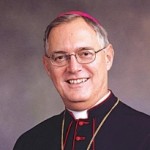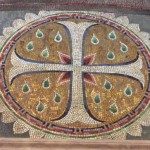I am the luckiest blogger in the world, I think, because the folks who comment, or who email, tend not to be troll-ish or mean (except for whoever sent me that virus, and I’ll get you, my pretty, and your little dog, too!) and when they do differ with me, they usually do it thoughtfully.
One such reader – agnostic – wondered what was so great about Catholicism, and didn’t I think that God – if God exists – would be the same regardless of the existence of the Catholic Church, without its sacraments and its “beautiful marble buildings and stained glass windows? Wouldn’t God be the same if you just went and worshiped somewhere else?”
I like the question.
Well, of course God would be the same. God is the same yesterday today and tomorrow.
We, perhaps, might not be the same.
God was the same before Abram first encountered him and became Abraham – when the concept of ONE God was still unheard of.
God was the same in the time of Moses, when the Jews traveled through the desert, losing faith over and over.
God was the same when Jesus was born and the angels came to herald His birth praising God and saying, “Peace on earth to men of good will.”
God was the same when Jesus lay bleeding and broken on the cross, being jeered at and pelted and gambled over.
God was the same when Jesus appeared to Thomas, the doubting one, and said, “Blessed are those who have not seen, and yet believed.”
God was the same when Mary and the Apostles were waiting in the Upper Room, too afraid to go out – until the thunder came and the tongues of flame danced above them.
God was the same when people were healed simply by being under Peter’s shadow.
God was the same, is the same. For ages unto ages.
But would we be the same?
Considering the history of the Church, both dark and light, good and bad, where would we be up to now without it? How would our Western culture have survived the dark ages were it not for the monks who saved and transcribed our history?
One can heap scorn on the “marble buildings and stained glass windows” if one wants, but one should first recognize that those buildings and windows served an illiterate age both in the visual retelling of the gospels and traditional stories, and in their very awe-inspiring transcendence – the bit of “heaven on earth” a taste of the glory of God for a civilization lacking parity or charity.
Have they served their purpose and is it time to be done with them? Perhaps. But when my elder son was 16 he made a trip to Italy with his class, and he told me this: As he went through Italy the comment he heard from his friends, over and over, was that the ornate, ancient churches, in all of their extravagant beauty, were giving them a “sense of God” that they’d never encountered in their modern Catholic or Anglican or Presbyterian church buildings.
I’m just relating a what he said, not opening a debate on ecclesiastical architecture.
Encountering God with all of our senses, including sight, smell, etc…it’s a way to learn. What seems needless to some can still seem quite effective and even necessary to others, for we are not all the same; we have different needs, different ways of processing information, different ways of learning, teaching, etc. Take away all of those beautiful buildings, take away Mozart’s Requiem and Bach’s Mass in B minor and the Panis Angelicus, and yes, God is still the same, but we are not.
Take away the sacraments and is God the same? Yes, certainly God is. Do we need sacraments? Some would say we do not. If we look at Mark 5:25-34 we note the presence of all of the essential elements of a Sacrament: the person’s faith, the physical sign, the supernatural power flowing out of Jesus.
Another quick story: My elder son (same kid) began, in his senior year, to talk with a schoolmate who called himself a Wiccan and said he worshiped creation. They had amiable, friendly debates and this boy has said that since hearing about Christ and Christianity from my son he was more favorably disposed to it – he even attended an Easter Vigil mass to observe. I suspect he might have been excited about the blessing of the fire and water, but whatever.
My son was happy to be able to witness in this way and, back when all of this was going on, he told me that he had felt this interest in witnessing, and in religious studies of all sorts, since the 7th grade. Then he suddenly realized, “oh yeah…I was confirmed in the 7th grade…the fruits of the Holy Spirit include wisdom, understanding, knowledge, counsel…wow, this is all Sacramental Grace in Action!”
Take away the pope and the hierarchy and is God the same? Absolutely. But we know that every word of Jesus’ in the Gospel has meaning – there are no throwaways – at no point did Jesus say something without meaning, just to hear himself talk. So, if Peter was not the Rock, then why did Jesus give him the Keys to the Kingdom?
Do we need a central, “head office” sort of deal?
Well, maybe not. But we humans DO tend to create such offices all the time, so while God doesn’t need them, perhaps we do. Without some sort of Authority, particularly in matters of scriptural interpretation, you would see what we have seen over and over again since the Reformation: the continual spinning off of church after church due to varying scriptural interpretations or emphasis.
Here in the US we look to our Supreme Court to give us direction. In the church – in the Latin Rite – we look to Rome. Some would say we look to Rome a little too much, and there are plenty of liberal Catholics out there who have been clamoring for an end to this centrality – to give more power to local bishops – but recent history suggests that too much autonomy is not particularly heathy for a diocese.
What about the Holy Eucharist? Would God be the same if the church did not celebrate the Holy
Mass, every day, time-zone, by time-zone, around the globe, literally covering the planet 24/7 with both the Liturgy of the Word, within the Mass, and the Word-made-flesh within the Real Presence?
Yes, God would be the same. But I cannot believe we would.
As to worshipping “somewhere else,” for those of us who believe in the Eucharist and the Real Presence of Christ in the Blessed Sacrament, we could not possibly be the same without it. For us…where do we go? It is not right, respectful or proper to simply say, “go worship somewhere else; you’ll get over it.”
“Lord, to whom shall we go…”
I could go on forever, but I will stop. I have no intention of entering into a day/night long defense of what I have simply written off the top of my head, but here is the bottom line: Just as we all learn differently, metabolize food differently, process emotions differently and express ourselves differently, so do we all express our worship of the Triune God differently. Whatever dislike one has of the Catholic Church, have not those who prefer to worship in this manner the right to that preference? Without being called blind or mind-controlled or the like?
There was a quote I read once – I have no idea who said it first, but I wrote it down because I liked it: “your tolerance or lack of it speaking about your religion more eloquently than any creed.” It is a good comment for all of us to remember.











